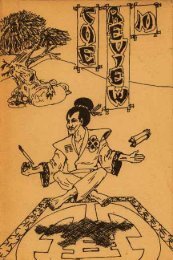Create successful ePaper yourself
Turn your PDF publications into a flip-book with our unique Google optimized e-Paper software.
It was another year before Lloyd had the money to get there. He had a<br />
year to think of possibilities, and one of them was Dr. Renard.<br />
It makes me ashamed to think of poor Lloyd in Los Angeles, getting<br />
honked at and half run-over. Getting lost, asking for his first hotel room. If<br />
I had known he was there in the city, perhaps I would have offered my aid.<br />
I doubt he would have accepted it.<br />
When Lloyd took the elevator up to Dr. Renard's office, which was on<br />
the fourteenth floor of a glass building on Venice Boulevard, he suffered<br />
from vertigo. The elevator was glass too, on all sides, such that he could<br />
see the slender cables over his head, the floor disappearing under his feet.<br />
Something about it made him utterly disoriented, like when he was out in a<br />
squall on Gut Bay, everything white all around him. He clenched his eyes<br />
closed until he made it to the top.<br />
The receptionist, her face gleaming and pink from a recent chemical<br />
peel, tried to take Lloyd's name, tried to glean the reason for his visit. He<br />
sat down for a minute on a white leather sofa with silver legs, his back to<br />
the glassed view of downtown Los Angeles, but he did not relax or pick<br />
up a magazine. He observed the situation long enough to see the door to<br />
the hall where patients entered and later left, their faces raw and red and<br />
sometimes blue and partially wrapped in bandages. Then he stood up and<br />
walked toward the door.<br />
You can imagine the ruckus which followed, the receptionist chasing<br />
after him in her five inch pumps, grabbing at his arm. Finally she gave up<br />
and ran back to her desk where she pressed a button and shouted things into<br />
the enormous black phone.<br />
The office door was open a crack. From all the commotion, Lloyd<br />
expected Dr. Renard to lunge at him, to try to run past him, but he was<br />
just sitting there in his swivel chair, his hands calmly folded in his lap, as if<br />
he had been waiting for Lloyd all afternoon, as if he had known he would<br />
come.<br />
"Lloyd, good to see you again. You've come a long way."<br />
Sometimes I imagine their conversation. Lloyd, you see, is not a man<br />
of details. When I asked him what happened that day on the porch, he told<br />
me, but he didn't talk about what Dr. Renard said, or what he said to Dr.<br />
Renard. It is hard to imagine what those two men had to talk about, what<br />
they possibly could have had in common, except Dora, of course.<br />
She wasn't living with Dr. Renard; that would have been a problem since<br />
the doctor was married and had been to one of his patients for ten years.<br />
But he had helped her find an apartment in Encino—it is amazing I never<br />
ran into her there myself, as my wife and I live in Sherman Oaks—and they<br />
were, Dr. Renard said, quite close in a way Lloyd could never understand.<br />
Elizabeth Eslami 109






